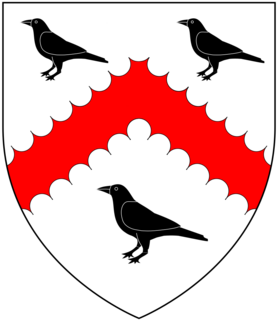
William de Redvers, 5th Earl of Devon, of Tiverton Castle and Plympton Castle, both in Devon, was feudal baron of Plympton in Devon.
Devon was a parliamentary constituency covering the county of Devon in England. It was represented by two Knights of the Shire, in the House of Commons of England until 1707, then of the House of Commons of Great Britain from 1707 to 1800 and finally the House of Commons of the United Kingdom from 1801 to 1832. Elections were held using the bloc vote system of elections.

The Reynell surname is an early form of the Reynolds (surname).

William Brewer of Tor Brewer in Devon, was a prominent administrator and judge in England during the reigns of kings Richard I, his brother King John, and John's son Henry III. He was a major landholder and the founder of several religious institutions. In 1204, he acquired the feudal barony of Horsley in Derbyshire.

Sir Richard Reynell, son of Sir Richard Reynell, of Pyttney, was a knight to whom King John restored the lands of which his father had been deprived, on condition that he should serve him with horse and armour for one year. Details of this arrangement appear in a deed dated at Bined, 27 July 1214, a copy of which is in the Harleian MSS. No. 1195.

Richard Reynell (1519–1585) of East Ogwell, Devon, was an English Member of Parliament. An account of him and his sons is given by John Prince in his Worthies of Devon.

Sir Richard Reynell (c.1558–1633) of Forde in the parish of Wolborough, Devon, was an English lawyer and Member of Parliament. He built the surviving Ford House, now in the suburbs of Newton Abbot and his daughter and sole heiress Jane Reynell, married the Parliamentary general Sir William Waller.

The Reynell Baronetcy, of Laleham in the County of Middlesex, was a title in the Baronetage of Ireland. It was created on 27 July 1678 for Richard Reynell, subsequently Member of Parliament for Ashburton in Devon, and Lord Chief Justice of the King's Bench in Ireland 1691–1695. The 2nd Baronet, his son, represented Wicklow Borough in the Irish House of Commons, but in contrast to his father had a generally undistinguished career. The 6th Baronet was a distinguished soldier who fought at the Battle of Waterloo. The title became extinct on his death in 1848. They were a junior branch of the ancient Reynell family of East Ogwell and West Ogwell in Devon.

Sir Edmund Fowell, 1st Baronet of Fowelscombe in the parish of Ugborough in Devon, was a Member of Parliament for Ashburton in Devon from 1640 to 1648.

Thomas Reynell of East Ogwell, Devon, was an English lawyer and politician who sat in the House of Commons at various times between 1654 and 1689.

Sir Carew Reynell was an English courtier, soldier and politician who sat in the House of Commons at various times between 1593 and 1622.

Sir Richard Reynell, 2nd Baronet (1673–1723) was an Anglo-Irish politician, barrister and landowner who sat in the Irish House of Commons as member for Wicklow from 1692 to 1693.

Sir Edmund Prideaux, 1st Baronet (1554–1628), of Netherton in the parish of Farway, Devon, was a Councellor at Law and Double Reader of the Inner Temple and was created a baronet on 17 July 1622. He purchased the estate of Netherton where in 1607 he built a new mansion house, known today as Netherton Hall, a grade II listed building. He was one of John Prince's Worthies of Devon.

West Ogwell is a village and former civil parish and manor in Devon, England, located 2 miles south-west of the town of Newton Abbot and 1 mile west of the village of East Ogwell. It is now in the civil parish of Ogwell, administered by Teignbridge District Council. The church and manor house "lie hidden away on their own".

Richard Crocker of Devon, England, was a Member of Parliament for Tavistock in Devon in 1335. His descendants were the prominent Crocker family of Crocker's Hele in the parish of Meeth, Devon, later seated at Lyneham in the parish of Yealmpton, Devon until 1740.

Sherford is a village and former civil parish and manor, now in the parish of Frogmore and Sherford, in Devon, situated about 2 1/2 miles east of the town of Kingsbridge. It should not be confused with the new town Sherford to be built on the outskirts of Plymouth, about 18 miles to the north-west. The parish church is dedicated to Saint Martin of Tours. In 1961 the parish had a population of 258. The parish was abolished in 1986 and merged with parts of South Pool and Charleton to form "Frogmore and Sherford".

Walter Reynell was a Member of Parliament for Devon in 1404.

Walter Reynell of Malston in the parish of Sherford, Devon, was a Member of Parliament for Devon in 1454/55.

John Reynell was a Member of Parliament for Devon in 1427/28.

Hugues de Revel was the twentieth Grand Master of the Knights Hospitaller, serving first from 1258–1277 as the successor to Guillaume de Chateauneuf. He was succeeded by Nicolas Lorgne.









